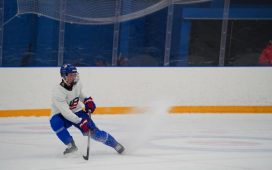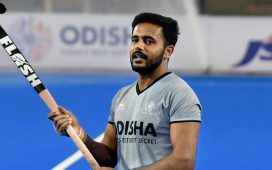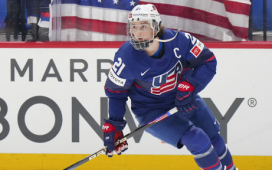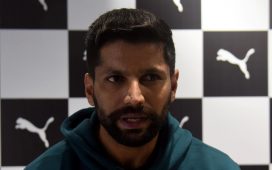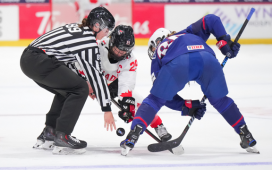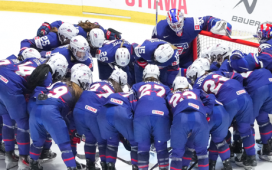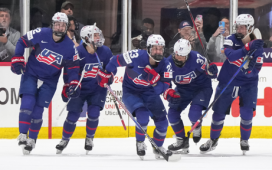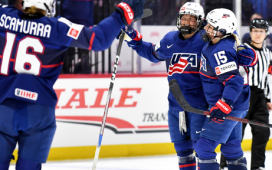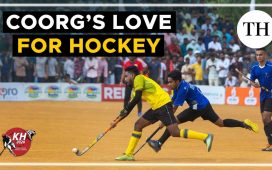In the midst of the NHL’s suspended season and the global coronavirus pandemic, NHL agent and Will Sports Group co-founder – the agency that represents Tyler Seguin, David Savard, Thomas Chabot and Miro Heiskanen, among others – spoke with The Hockey News’ owner and publisher W. Graeme Roustan about how he’s getting through the COVID-19 pandemic, staying in contact with players and working alongside families during these tough times.
Graeme Roustan: Ian, thank you very much for spending some time with the readers of Sports Illustrated and The Hockey News.
Ian Pulver: Thanks for having me on.
GR: First and foremost, how are your employees doing?
IP: They’re doing well. They’re all in isolation with their families. Dom (De Blois) has two children and is married, and John Walters, a consultant in Ontario, has four children and is married. Everybody is doing well. We have consultants in Minnesota and Finland, consultants in the Maritimes, and everybody is doing as well as they can. We did our first Zoom call this morning, which was kind of fun and new to us. We got a little interaction, and it was great technology and was quite helpful to catch up while looking at people.
GR: Without breaking any confidences, generally speaking, how are your players doing?
IP: They are coping and hanging in there to the best they can. We’re all in uncharted waters, and their outlooks are realistic and understanding. Our consultants that work hand in hand with me are doing a great job staying in touch with our players. There’s a trickle-down effect. We start and talk about the pro players, but there are OHL players, QMJHL players, USHL players, there are some college players that we advise, and it trickles down even to the midget AAA loop in Quebec or minor midget in Ontario that are getting ready for their drafts. There’s a lot of uncertainty and questions. There are players that, for example, just finished their OHL careers that are overage unrestricted free agents or college seniors graduating and wondering what’s going to happen to them. We have a player that is graduating in May who played NCAA, and he’s from Russia, and he’s staring a student visa in the face. He doesn’t know whether he’s going to be able to stay in the country or not until he gets signed. There’s a lot of uncertainty. But I think there’s also a lot of realism to know that they’re all doing OK under the circumstances.
GR: You bring up a great point. We all focus on the NHL players, but a large part of what you do and what your firm does is work with the families and the players in the minor leagues to try to get them to the NHL. How are the parents doing?
IP: The parents, for the most part, are more heavily involved in the infancy of the journey of a player who is aspiring to play junior, college or pro. Some parents stay on board and then they handle things all the way right through until the player’s 35 years old. Other parents will leave it to their sons to develop a relationship with the consultant. But they’re like any parent of a university student or any parent of someone working in a vocation. So it’s across the board in that department. We take all the calls and return all the calls and do our best to provide the information. But we know as much as the next person, and there’s a lot of wonderment and hope that this will soon end.
GR: I want you to put your NHLPA hat on that you wore for 15 years. There have been a few players that have tested positive with the virus. What do the players think on a collective basis? Not just your own players, but collectively.
IP: I think it’s the same thing as if a brother or sister or a family member or just Joe citizen that they don’t know. I think that the unknown is bothersome to everybody. Hockey players are a special breed – they all care for each other. And I think that they would want those guys to have a speedy recovery. I don’t think they’re scared in any way. Maybe teammates of those players in Ottawa are being extra careful and searching out tests. But I don’t think there’s anything outside of the ordinary course of thoughts or feeling any different.
GR: Today we have a new reality where a disease or a virus in a faraway country can wreak havoc around the world. This is sort of a rude awakening for everyone, including players. Do you think that this is now in the psyche of players when they think about the Olympics in China in 2022?
IP: That’s a good question. I think that the psyche of the players will be that if it’s safe, and the (WHO) and the CDC and all their nations have signed off on it, they’re going to want to play. Hockey players are trusting individuals, and they’ll want the information and education. A lot will fall on the shoulders of the National Hockey League Players Association to do their homework for the players to have them endorse participation. And if they get that endorsement, then players will probably be excited to play in the Olympics again, if it’s negotiated that they can go.
GR: Do you think that with the other cancellations that have taken place in the recent weeks that the NHL is pondering the cancellation of the season? Or do you think that it’s still a wait-and-see?
IP: I think it’s a wait and see. I think that the league office, the owners and players…if there is a possibility to play, they will want to play. There has been some discussion about possible play as late as July and August. I think that there’s a lot of things that flow from that, whether TV can cover it, whether buildings can schedule it. I think that they want to hand out the Stanley Cup, and I believe that they’re in a wait-and-see approach. I think the recent cancellation of the Olympic Games in the summer may have been a blessing in disguise for TV if there’s a possibility of a return to play. So I really feel that they’re going to wait as long as they can and not cancel until they’re either told to by government officials who may make it impossible to play. But when you strip it all down, I think that the league office and the NHLPA will be cognizant and respectful to put the health of club officials and players alike, first and foremost. And more importantly, the fans and the public. Time will tell.
GR: You represent many international players. What’s your sense of what’s going on in the hockey industry around the world?
IP: The Finns are going through what we’re going through – social isolation. They’re waiting. Liiga got shut down, the World Championship and U-18s, too. There might not be a tournament here in Plymouth, Mich., for the U-20s. They’re in isolation, just like your listeners, just like the players are in North America. Our Finns, they all flew back from their NHL and AHL towns. Three of them are in Espoo, Finland and they have been doing their own private workouts. I don’t know if the rules are exactly the same. I think they can have small group workouts there, which right now are prevented here. When I say small groups, I think no more than four is my understanding. I just talked yesterday with Igor Larionov, my former partner in this business, and he called me and he was out for a late-night walk. Igor is quite the workout aficionado and still in tremendous shape. He said that he has never seen downtown Moscow, the Red Square area, as quiet as he saw it. He said that there’s never been a complete shutdown over there. I had a player, Ryan Murphy, who played with Neftekhimik (Nizhnekamsk) whose season ended at the end of the first round of the playoffs and was luckily able to come home. He went back to Ontario, and he’s in self-isolation with his family.
GR: How are you and your family managing through all this?
IP: Thanks for asking. It’s obviously different for everybody. Our twins are back, and they’re doing their online university, and our eldest is here, too. And everybody’s healthy and patiently getting through this and are hunkered down and enjoying our time together the best we possibly can just like everyone else. How are you doing in your family?
GR: I think the answer you just gave is the answer that I would give, and probably millions of people around the world would give: we’re all hunkered down. We’re all taking care of each other where we’re spending more time together. But in your case, I think you’re actually busier than I am and busier than most people because you’re not just dealing with the normal business that you’re dealing with, but this is a time where a lot of your clients have a lot of questions, and you’re probably on the phone twice as much as are normally.
IP: It’s been busy. I believe that the industry quietly is humming along, doing some business for college players and European players, answering questions that their own players that they represent have. The agents are on the phone with the NHL Players Association getting updates. That’s the same thing I’ve heard from a lot of NHL teams. They continue to do conference calls with their amateur scouts, their pro scouts, their training staff. I do know that training staff around the NHL are checking in with players to see if they have any questions, checking on their health, checking out on their workout routines. So the phone lines are buzzing quietly and respectfully against the backdrop of these uncertain times.
Parts of this Q&A have been edited for clarity.
Want more in-depth features and analysis? Subscribe to The Hockey News magazine.
